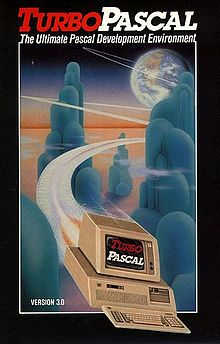| Turbo Pascal Turns 40 |
| Written by Sue Gee | |||
| Tuesday, 02 January 2024 | |||
|
Towards the end of 2023 Turbo Pascal turned 40 and prompted many of us to remember it as one of the breakthoughs in programming languages. As a compiler combined with an IDE, Borland brought out a product that was both affordable and fast. In 1983 it was the IBM PC, launched in 1981, that set the standard and the computer went from being the preserve of government, universities and major corporations to that of organizations and businesses of all sizes. This was the era of the PC clone, making computing power accessible to individuals, to "the rest of us" and suddenly programming languages and tools had a mass market. Borland, also dating from 1981 when it was founded by Philippe Kahn, was quick to establish itself as a major player in the early PC software market, particularly in the development tools and database management sectors with Turbo Pascal as its pioneering flagship product, Pascal had been developed at ETH Zurich in the late 1960s by Niklaus Wirth who specifically designed the language for teaching introductory programming concepts to students on the CDC 6600 mainframe computer. It quickly gained traction and was ported to numerous other platforms due to its clear syntax and structured approach. The Pascal compiler core at the heart of Turbo Pascal derived from Blue Label Software Pascal created for the Nascom-2 microcomputer by Anders Hejlsberg, who then rewrote it for CPM and DOS as "Compas Pascal" and then "PolyPascal", a reference to the name, PolyData, of the company Hejlsberg had founded. After Borland licensed the Pascal compiler Hejlsberg initially remained with PolyData, while acting as a consultant on the further development of Turbo Pascal, He eventually became a Borland employee in 1989 and was the architect for later versions of the Turbo Pascal compiler. Under Borland the compiler introduced a user interface and editor, recognized as an Integrated Development Environment (IDE) where you could edit the code, run the compiler, see the errors, and jump back to the lines containing those errors. The Turbo name highlighted the speed of compiling and of the executables produced. The edit/compile/run cycle was fast compared to other Pascal implementations because everything related to building the program was stored in RAM, and because it was a one-pass compiler written in assembly language. As well as being fast, Turbo Pascal was inexpensive. At its launch it retailed for US $49.99, a very low price for a compiler at the time. It was also a shareable product. Unlike other development tools, Turbo Pascal disks had no copy protection and instead came with the so-called "Book License": "You must treat this software just like a book ... [it] may be used by any number of people ... may be freely moved from one computer location to another, so long as there is no possibility of it being used at one location while it's being used at another."
More InformationRelated ArticlesNiklaus Wirth Inventor Of Pascal For Teaching Computer Science The Rise Of People Power - Computer Languages in the 1970's Four Of Most Important Language Designers In Conversation To be informed about new articles on I Programmer, sign up for our weekly newsletter, subscribe to the RSS feed and follow us on Twitter, Facebook or Linkedin.
Comments
or email your comment to: comments@i-programmer.info
|
|||
| Last Updated ( Tuesday, 02 January 2024 ) |


